- By -Staff
- News
 Print
Print 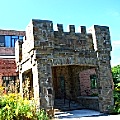 Lansing Supervisor Kathy Miller and Town board members Ed LaVigne and Ruth Hopkins were joined by members of the East Shore Arts Council, priests from a local church, and a representative of a school. They were among the interested parties at a recent tour of the Lansing Girls Residential Center, along with Tompkins County Legislator Mike Sigler, Miller, Park Superintendent and Recreation Director Steve Colt and Lansing Historian Louise Bement. Miller says it’s all or nothing — the property will not be split among multiple buyers.
Lansing Supervisor Kathy Miller and Town board members Ed LaVigne and Ruth Hopkins were joined by members of the East Shore Arts Council, priests from a local church, and a representative of a school. They were among the interested parties at a recent tour of the Lansing Girls Residential Center, along with Tompkins County Legislator Mike Sigler, Miller, Park Superintendent and Recreation Director Steve Colt and Lansing Historian Louise Bement. Miller says it’s all or nothing — the property will not be split among multiple buyers."It was very interesting," said Miller at last week's Town Board meeting. "What an incredibly beautiful piece of property that is! It's breathtaking. The State won't break it up. They won't break it up into the school and the pods and the gymnasium. The whole piece is being sold as one."
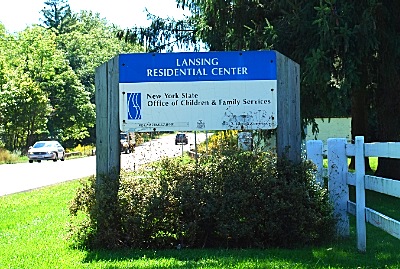 The Girls School is located north of the boys facility on Auburn Road, across the street from Kingdon Farm
The Girls School is located north of the boys facility on Auburn Road, across the street from Kingdon Farm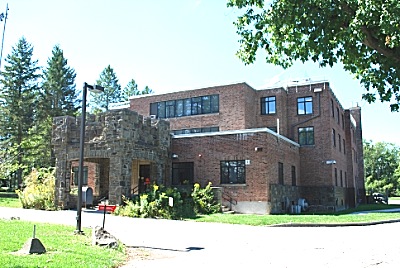 The 'castle' building is bigger than it appears from the road.
The 'castle' building is bigger than it appears from the road.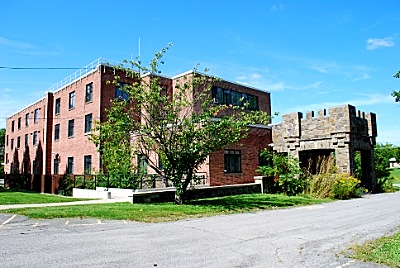 The main buiilding has two wings, mirror images
The main buiilding has two wings, mirror images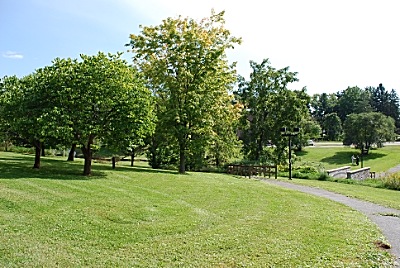 The entire campus is immaculately cared for
The entire campus is immaculately cared forInside are two wings that are virtually mirror images of each other. They contain residential rooms, classrooms, offices and an industrial kitchen, as well as special purpose rooms. However nice the exteriors look, the interiors of all the buildings are institutional and drab, and somewhat depressing as buildings that are no longer inhabited tend to be. Construction is beefy, making it difficult to knock out walls to repurpose the facilities.
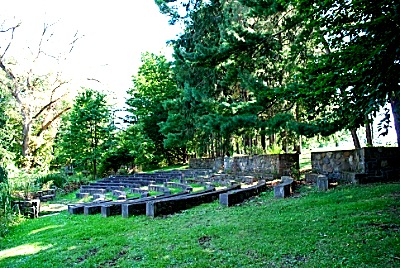 An outdoor Greek theater is built into a hill. It has a small performance space at the front, and overlooks a pond. on the far side of the pond are some large flat stones. Speakers stood on the stones at commencement ceremonies held at the theater when the dentention center was open.
An outdoor Greek theater is built into a hill. It has a small performance space at the front, and overlooks a pond. on the far side of the pond are some large flat stones. Speakers stood on the stones at commencement ceremonies held at the theater when the dentention center was open.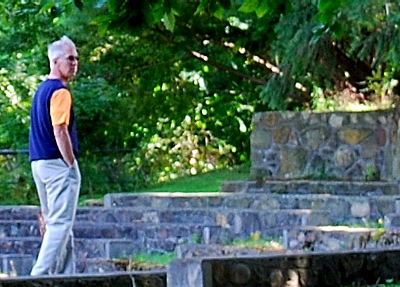 Park Superintendent and Recreation Director Steve Colt enjoys the Greek theater
Park Superintendent and Recreation Director Steve Colt enjoys the Greek theaterThe facility includes rolling hills, streams, ponds, and a beautiful landscape, as well as an outdoor theater modeled on the ancient Greek theaters, a gymnasium with an outdoor pool, another large brick building that housed the psychiatric care unit, a row of two bedroom apartments that were used to help incarcerated girls prepare for life after they were released, workshops, a greenhouse and gardening shed, as well as the castle building and three pods.
Two of the pods were residential with small residential rooms surrounding a large central area. Each room has a platform for a bed and a desk, with little room for anything else. The door knobs work on the outside, but not from the inside. The third pod was a vocational skills teaching facility.
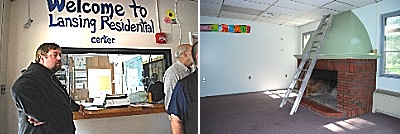 Inside the main building, an entrance foyer (left) and a room with a large fireplace that dates back to the Jehovah's Witness school that was the original use of the building
Inside the main building, an entrance foyer (left) and a room with a large fireplace that dates back to the Jehovah's Witness school that was the original use of the building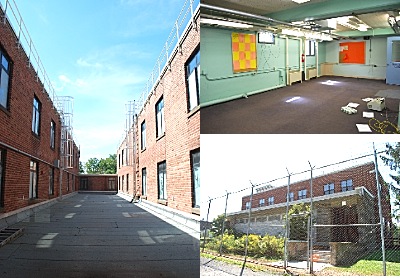 Between the two wings of the 'castle' building is an area that could be perfect for a rooftop café. Another building (lower right) used for psychiatric care could be turned into art and music practice rooms, or office space.
Between the two wings of the 'castle' building is an area that could be perfect for a rooftop café. Another building (lower right) used for psychiatric care could be turned into art and music practice rooms, or office space.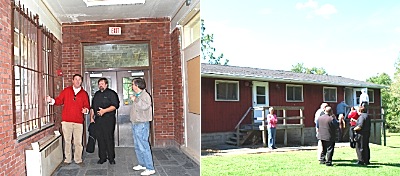 County Legislator Mike Sigler, Father James Worthington and Lansing Councilman Ed LaVigne in the psychiatric care building (left). At right is a row of two bedroom apartments.
County Legislator Mike Sigler, Father James Worthington and Lansing Councilman Ed LaVigne in the psychiatric care building (left). At right is a row of two bedroom apartments.What is now the boys and girls schools was part of a 600 acre tract of land that the Jehovah's Witnesses purchased in 1935. Lansing historian Louise Bement says the great flood of 1935 ruined many of the crops and washed out two dams on the farm. It also washed out an old railroad bridge of the former New York, Auburn & Lansing Railroad which ran through the farm.
"After suffering these loses, it was decided to build a new house with a large communal dining room to serve as a center for the new development," Bement says. "This large house was completed in the late summer of 1935. Then to replace the burnt-down dairy barn, the Kingdom Farm Association decided in 1936 to build a large, modern barn structure measuring 180 feet by 30 feet and 40 feet high. Then in 1941 a large 40,000 square foot brick building was erected for administration purposes and for dormitory and general household uses."
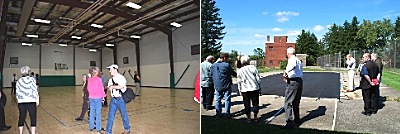 A large gymnasium sports an outdoor swimming pool and outdoor athletics fields
A large gymnasium sports an outdoor swimming pool and outdoor athletics fields That was the 'castle' building, which was used for a ministry school until it was moved to Brooklyn. The building was used for the Kingdom Ministry School until it moved to Brooklyn in 1967. In 1968 the school buildings and some of the farm buildings and land were sold to New York State for the Lansing School for Girls.
The rest is what is now Kingdom Farm. In the '90s the Society considered building a community there to print the Jehovah's Witnesses' Watchtower publication that would include residences as well as the printing facilities. But a decision was made to locate Watchtower elsewhere, and Kingdom Farm is also currently for sale.
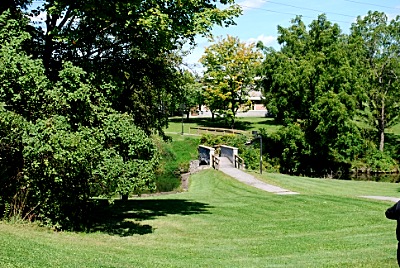 A bridge leads from the main campus to the 'pods' on the north side of the facility
A bridge leads from the main campus to the 'pods' on the north side of the facility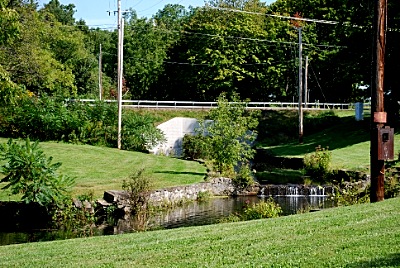 Looking at Auburn Road from the bridge, the entire campus is beautifully landscaped.
Looking at Auburn Road from the bridge, the entire campus is beautifully landscaped.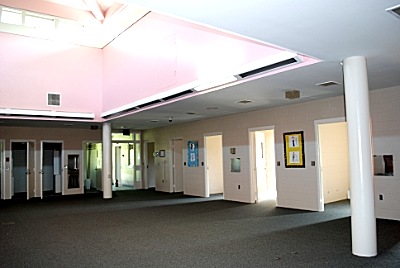 A large common room is a feature in each of the three 'pods'
A large common room is a feature in each of the three 'pods'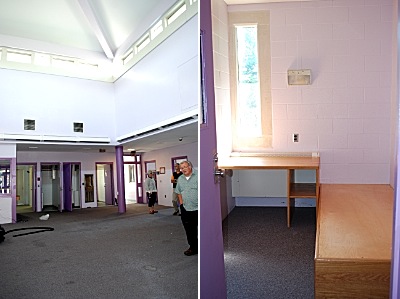 Common rooms in the pods are spacious, but the rooms the girls resided in (right) were quite small
Common rooms in the pods are spacious, but the rooms the girls resided in (right) were quite smallNobody was surprised when the juvenile detention center closed. After pressure from New York City to bring the facilities closer to the residents' families, and of course creating jobs in the New York City area, facilities including the Lansing Girls Residential Center and Tryon Residential Center were shut down. The Lansing campus was put up for sale this year.
The juvenile detention facilities are managed by Office of Children and Family Services (OCFS) facilities, which still manages the boys school next door. They are talking about moving some of those kids closer to the cities and closer to home.
New York City developed the 'Juvenile Justice Initiative' to bring city youth home from upstate residential centers, focussing on community-based alternative-to-incarceration programs. That meant some employees were relocated to other facilities including the Boys facility here in Lansing. That left the girls school property empty, and the state is now trying to sell it.
Various ideas are being floated for the Town to obtain the facility and use it for multiple purposes, including much needed recreation Department storage and parks, and possibly to move some offices out of the Town Hall to make more room for Town Court operations there.
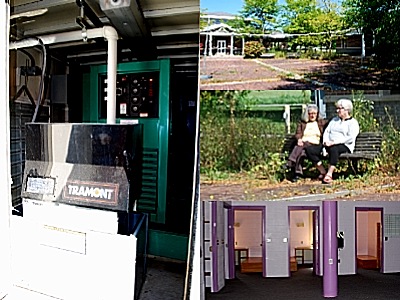 A generator (left) kicks in 9 seconds after power is lost. At right: the three 'pods' have a lovely brick courtyard that was used for volleyball, walking and resting. Right center: CLansing Councilwoman Ruth Hopkins and Supervisor Kathy Miller take a short rest. Right bottom: large common rooms at the center of the 'pod' buildings are surrounded by small cells where girls lived.
A generator (left) kicks in 9 seconds after power is lost. At right: the three 'pods' have a lovely brick courtyard that was used for volleyball, walking and resting. Right center: CLansing Councilwoman Ruth Hopkins and Supervisor Kathy Miller take a short rest. Right bottom: large common rooms at the center of the 'pod' buildings are surrounded by small cells where girls lived.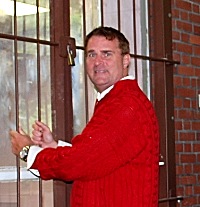 Is County Legislator Mike Sigler behind bars? Or in front of them?Because the facility has its own generator and other infrastructure it is possibly the only facility in lansing that could be used as an emergency shelter in cases like we saw earlier this summer when residents were without power and water for days after a fierce storm. Whatever is not needed by the Town could be leased to other interested parties, potentially paying for maintenance of the facility so that taxpayer money need not be used.
Is County Legislator Mike Sigler behind bars? Or in front of them?Because the facility has its own generator and other infrastructure it is possibly the only facility in lansing that could be used as an emergency shelter in cases like we saw earlier this summer when residents were without power and water for days after a fierce storm. Whatever is not needed by the Town could be leased to other interested parties, potentially paying for maintenance of the facility so that taxpayer money need not be used.There is interest in creating an arts center and the Greek theater would be an ideal location for summer concerts and small-cast plays. But Town officials will have to be convinced that maintenance and utility costs would not be overwhelming.
Miller told the Town Board about the tour at last week's board meeting, but was noncommittal about possible Town interest.
"There were a number of other interested parties," she said. "I hope something good comes of it and it will be nice to get it back on the tax roles. But I don't know that that's gong to happen."
v10i36



